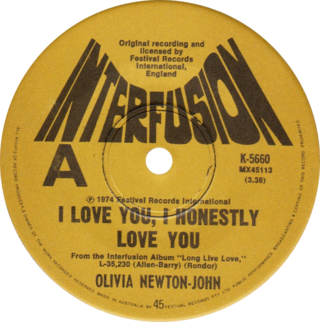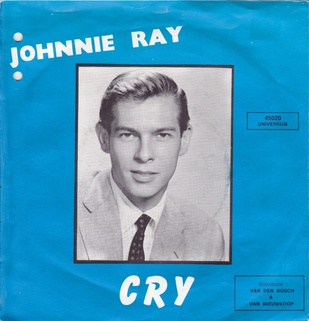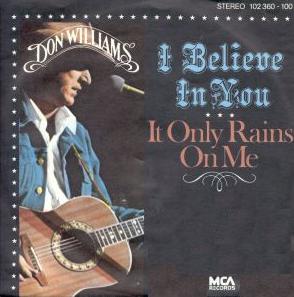Related Research Articles

"Me and Bobby McGee" is a song written by American singer-songwriter Kris Kristofferson and originally performed by Roger Miller. Fred Foster shares the writing credit, as Kristofferson wrote the song based on a suggestion from Foster. A posthumously released version by Janis Joplin topped the Billboard Hot 100 in 1971, making the song the second posthumously released No. 1 single in U.S. chart history after "(Sittin' On) The Dock of the Bay" by Otis Redding. Gordon Lightfoot released a version that reached number 1 on the Canadian country charts in 1970. Jerry Lee Lewis released a version that was number 1 on the country charts in December 1971/January 1972 as the "B" side of "Would You Take Another Chance on Me". Billboard ranked Joplin's version as the No. 11 song for 1971.

"I Honestly Love You" is a song recorded by Olivia Newton-John and released in 1974 on the album Long Live Love in the United Kingdom and If You Love Me, Let Me Know in the United States. The song became a worldwide pop hit, her first number-one single in the United States and Canada. The single was first released in Australia as "I Love You, I Honestly Love You", as per its chorus. The song was written by Jeff Barry and Australian singer and composer Peter Allen. The latter recorded it around the same time for his album Continental American.

"Cry" is a 1951 popular song written by Churchill Kohlman. The song was first recorded by Ruth Casey on the Cadillac label. The biggest hit version was recorded in New York City by Johnnie Ray and The Four Lads on October 16, 1951. Singer Ronnie Dove also had a big hit with the song in 1966.
"Almost Persuaded" is a song written by Glenn Sutton and Epic Records producer Billy Sherrill and first recorded by David Houston in 1966. It is not to be confused with the Christian hymn of the same name.

"Once a Day" is a song written by Bill Anderson and recorded as the debut single by American country artist Connie Smith. It was produced by Bob Ferguson for her self-titled debut album. The song was released in August 1964, topping the Billboard country music chart for eight weeks between late 1964 and early 1965. It was the first debut single by a female artist to reach number one on the Billboard Hot Country Songs. This song peaked at number one for the week of November 28, 1964, and it stayed at number one for eight consecutive weeks, a record for a female solo artist for nearly 50 years, until it was surpassed by Taylor Swift's "We Are Never Ever Getting Back Together" in December 2012.
"How Can I Unlove You" is the name of a No. 1 country hit by country music singer Lynn Anderson, released in 1971. "How Can I Unlove You" was written by Joe South, who had also written "(I Never Promised You a) Rose Garden". The song was produced by Anderson's husband at the time, Glenn Sutton, who had also produced "(I Never Promised You a) Rose Garden". The song was nominated for Best Country Vocal Performance, Female at the 1971 Grammy Awards.

"You're My Man" is a song written by Glenn Sutton. The song was a popular No. 1 country hit by country artist Lynn Anderson from 1971.

"Tell Me a Lie" is a song composed by Mickey Buckins and Barbara Wyrick. Originally recorded by Lynn Anderson for her 1974 What a Man My Man Is album, it was released later that same year as a single by Sami Jo Cole, who took it to number 21 on both of the major U.S. pop charts. It also charted in Canada (#17). Cole's version was also an Adult Contemporary hit, reaching number 14 in the U.S. and number 27 in Canada.
"The Old Lamp-Lighter" is a popular song. The music was written by Nat Simon, the lyrics by Charles Tobias. The song was published in 1946.
"I Wonder Why" is a doo-wop song, written by Melvin Anderson with lyrics by Ricardo Weeks. The song was first recorded by Dion and the Belmonts.
"City Lights" is an American country music song written by Bill Anderson on August 27, 1957. He recorded it on a small Texas label called TNT Records in early 1958 to little acclaim. The song was first cut by Anderson in 1957 at the campus of the University of Georgia. In June 1958, Ray Price recorded it and his version hit number 1 on the Billboard Hot Country Songs singles chart in August 1958. Mickey Gilley's version also hit number 1 in June 1975.
"A Lover's Question" is a 1958 Pop, R&B hit for Clyde McPhatter. The single was written by Brook Benton and Jimmy T. Williams and was Clyde McPhatter's most successful Pop and R&B release. The bass singer is Noah Hopkins. "A Lover's Question" made it to #6 on the Billboard Hot 100 and was #1 for one week on the R&B chart.
"Please Help Me, I'm Falling" is a 1960 song written by Don Robertson and Hal Blair and first recorded by Hank Locklin. The single was Locklin's most successful recording and was his second number one on the country charts. "Please Help Me, I'm Falling" spent 14 weeks at the top spot and spent nine months on the country chart and crossed over to the Hot 100 peaking at number eight.
"Alabam" is a 1960 song written and performed by Cowboy Copas.

"Still" is a 1963 single by Bill Anderson. "Still" was Anderson's second number one on the country chart, staying at the top spot for seven non-consecutive weeks. The song crossed over to the pop chart, peaking at number eight. Anderson performed this song on the finale of the 1977-1978 ABC game show The Better Sex which he co-hosted with Sarah Purcell.
"Is It Wrong (For Loving You)" is a song written by Warner Mack. Mack recorded the song in 1957, and reached No. 9 on the Billboard country charts and spent 36 weeks on the chart.

"I Believe in You" is a song written by Roger Cook and Sam Hogin, and recorded by American country music artist Don Williams. It was released in August 1980 as the first single and title track from the album I Believe in You.

"Now and Forever (You and Me)" is a 1986 song written by David Foster, Randy Goodrum and Jim Vallance and recorded by Canadian country music artist Anne Murray. It was aided by a popular music video, filmed in Toronto. The back-up vocal was sung by Richard Page, lead singer for the pop group Mr. Mister. It was released in January 1986 as the first single from her twentieth studio album Something to Talk About.

"Sea of Heartbreak" is a song written by Paul Hampton and Hal David and recorded by Don Gibson in 1961. The song reached #2 on the Billboard Hot Country Singles & Tracks chart.

"Save Me" is a country-influenced pop song written by Guy Fletcher and Doug Flett. It was originally recorded in 1976 by Northern Irish singer Clodagh Rodgers, for her album of the same title, and released as a single. The song's narrator describes feeling bored and out of place at a party, and slipping out with the only man she is attracted to.
References
- ↑ Whitburn, Joel (2004). The Billboard Book Of Top 40 Country Hits: 1944-2006, Second edition. Record Research. p. 27.
- ↑ Whitburn, Joel (2013). Joel Whitburn's Top Pop Singles, 14th Edition: 1955-2012. Record Research. p. 36.